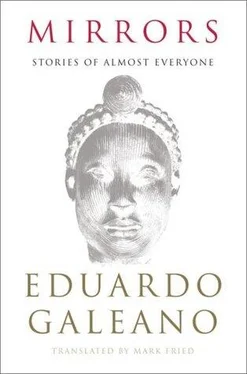Sometimes Oliver wonders:
“Since this is a war between whites, who for centuries have held us in slavery, why am I, a Negro, why am I here?”
And he answers:
“We came to wipe out the Fascists.”
And laughing he adds, as if it were a joke:
“Some of us must die doing that job.”

Mediterranean Sea, fall of 1938: Ramón Franco explodes in the air.
In 1926 he had crossed the ocean from Huelva to Buenos Aires in an airplane named Plus Ultra . And while the world applauded his feat, he celebrated with nights of carousing, toasting his glory, singing the Marseillaise, and cursing kings and popes.
Not long after that, on a drunk, he flew his plane over the Royal Palace in Madrid and refrained from dropping the bombs only because children were playing in the gardens.
He put two and two together and on he went: he raised the Republican flag, took part in an anarchist uprising, was elected to Congress on the Catalan nationalist ticket, and was charged by a woman with bigamy, although in truth it was trigamy.
But when his brother Francisco rebelled against the Republic, Ramón Franco suffered a sudden attack of familyitis and joined the ranks of the Cross and the Sword.
After two years of fighting, the remains of a plane, his plane, disappear in the waters of the Mediterranean. Ramón, with a load of bombs, had been headed for Barcelona. He was going there to kill those who had been his comrades, as well as the lovely lunatic he himself had been.

The border, winter of 1939: the Spanish Republic is falling apart.
From Barcelona, from the exploding bombs, poet Antonio Machado manages to flee to France.
He is older than his years.
He coughs, walks with a cane.
He gazes at the sea.
On a scrap of paper he writes:
“This sun of childhood.”
It is the last thing he writes.

Palma de Mallorca jail, fall of 1942: the lost sheep.
Everything is ready. Standing in formation, the prisoners wait. The bishop and the civilian governor arrive. Today Matilde Landa, a Red and leader of other Reds, convicted and confessed atheist, will convert to the Catholic faith and will receive the holy sacrament of baptism. The repentant woman will rejoin the flock of the Lord and Satan will lose one of his own.
It grows late.
Matilde does not appear.
She is on the roof, no one sees her.
From way up there, she jumps.
Her body explodes like a bomb against the ground of the prison yard.
No one moves.
The ceremony is carried out as planned.
The bishop makes the sign of the cross, reads a page from the Gospels, exhorts Matilde to renounce evil, recites the Apostles’ Creed, and anoints her forehead with holy water.
CHEAPEST JAILS IN THE WORLD

Franco signed death sentences every morning while he had breakfast.
Those not put before a firing squad were locked up. Those who were shot, first dug their own graves. And those who were imprisoned, first built their own jails.
Labor costs were zilch. The Republican prisoners who built the infamous Carabanchel Prison in Madrid, as well as many others throughout Spain, never worked less than twelve hours a day and got a handful of coins, nearly all of them invisible, as payment. What’s more, they received other benefits: the satisfaction of contributing to their own political rehabilitation, and a reduced sentence on this earth since tuberculosis would take them sooner.
For years and years, thousands upon thousands of criminals guilty of resisting the military coup did more than construct prisons. They were also forced to rebuild destroyed towns and erect dams, irrigation canals, ports, airports, parks, bridges, highways. They laid new railroad lines and left their lungs in the coal, mercury, asbestos, and tin mines.
And, prompted by bayonet thrusts, they erected the massive Valley of the Fallen monument, in homage to their executioners.

The sun shone at night,
the dead fled their graves,
every clown was king,
the insane wrote the laws,
the beggars were lords,
and the ladies gave off sparks.
And in the end, when Ash Wednesday arrived, people pulled off their masks, which did not lie, and put on their faces until next year.
In the sixteenth century, Emperor Charles in Madrid decreed the punishment for carnival and its wantonness: “If a lowly person, one hundred lashes in public; if a nobleman, six months in exile. . ”
Four centuries later, one of Generalissimo Francisco Franco’s first decrees was to outlaw carnival.
Invincible pagan fiesta: the more they forbade it, the more eagerly it bounced back.

Haiti and the Dominican Republic are two countries separated by a river called Massacre.
In 1937 it already had the name, which turned out to be prophetic: on the banks of that river thousands of black Haitians who had been cutting sugarcane on the Dominican side were chopped to bits with machetes. Generalissimo Rafael Leónidas Trujillo, mousey face, Napoleon hat, gave the order to exterminate them in order to whiten the race and exorcize his own impure blood.
Dominican dailies did not hear the news. Neither did Haiti’s papers. After three months of silence, something was published, a few lines, and Trujillo warned against exaggeration, for the dead numbered no more than eighteen thousand.
A long discussion ensued and in the end he paid twenty-nine dollars a head. In reparations.

In the 1936 Olympics, Hitler’s country of birth was defeated by the soccer team from Peru.
The referee, who disallowed three Peruvian goals, did what he could and more to avoid displeasing the führer, but Austria lost 4 to 2.
The following day, soccer and Olympic officials set things straight.
The match was annulled. Not because an Aryan defeat at the hands of an attacking line, known for good reason as the Black Steamroller, was inadmissible, but because, the officials said, fans had run onto the field before the end of the match.
Peru left the Olympics and Hitler’s country won silver.
Italy, Mussolini’s Italy, took the gold.

At the same Olympics, staged by Hitler to consecrate the superiority of his race, the star that shone brightest was black, a grandson of slaves, born in Alabama.
Hitler had no choice but to swallow the bitter pill, four of them actually: the four gold medals that Jesse Owens won in sprinting and long jump.
The entire world celebrated those victories of democracy over racism.
When the champion returned home, he received no congratulations from the president, nor was he invited to the White House. He returned to the usual:
he boarded buses by the back door,
ate in restaurants for Negroes,
Читать дальше




















